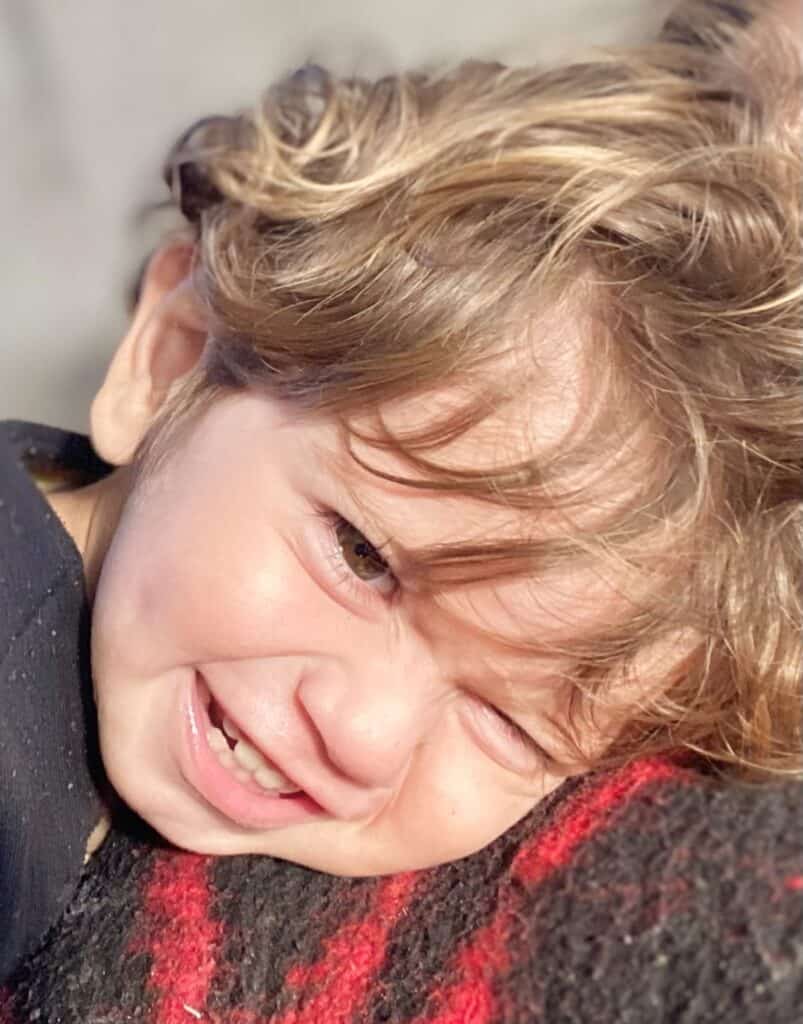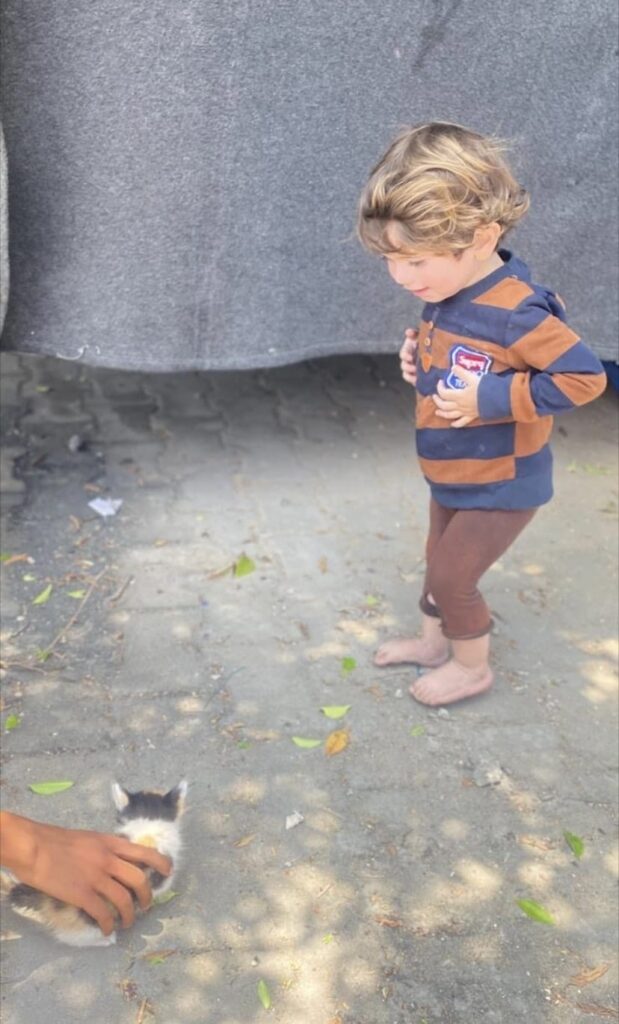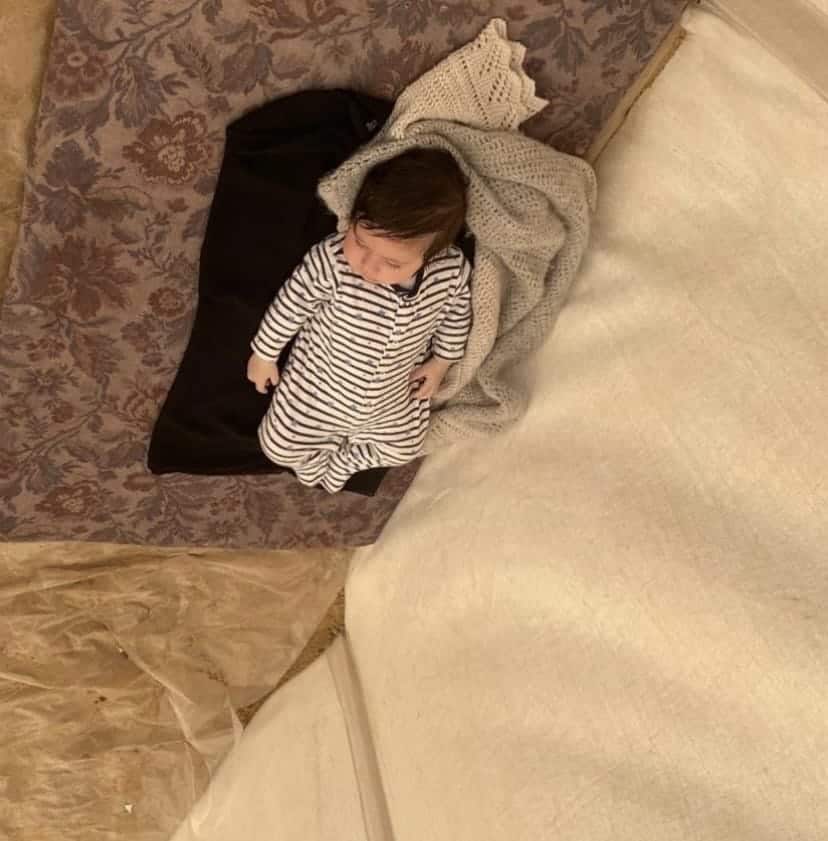My name is Itemad. Since October 2023, my life has turned into a constant journey between fear and survival. What began as a moment of displacement soon became a long story of pain, loss, and endurance in Gaza.
On 9 October 2023, I was displaced from my home in the Al-Tuffah neighborhood to my father’s home in Al-Shajaiya, near the city centre. I was suffering from biliary colic, and my life took a terrifying turn.
I was pregnant in the seventh month, so I knew that it was not the pain of childbirth. The pain lasted for four days. On 12 October, my husband, Mohammed, my parents, and I went to the hospital. The hospital was overcrowded with the injured and martyrs.
The hospital was overwhelmed with the stench of death, which deepened my fear and horror. Amidst this terrifying atmosphere, I met Doctor Rania, who carefully examined the fetus. She explained that the pain I was feeling was not physical but caused by my fear of the shells. Gently, she advised me to calm down and try to relax.
On October 13, 2023, the army threatened the residents of northern Gaza, forcing them to evacuate to southern Gaza immediately. We had no shelter there, but my family decided to go anyway, hoping to find safety. My husband’s family, however, refused to leave and stayed in the north of the Strip. Leaving behind our homes, our belongings, and the new clothes I had prepared for my child, we began our journey out of Gaza. With no transportation available, we walked for a kilometre until we found a truck heading south, which we took to Al-Zahra city. When we got off, we did not know where to go, since my aunt and her family had evacuated to Deir Al-Ballah just a few hours earlier. Despite being seven months pregnant, I walked another three kilometres to reach Deir Al-Ballah. I should not have walked all that distance, but I had no choice.
The next month, the road between the north and south was closed, preventing Mohammed from visiting his family. On 15 December 2023, as we walked together, he shared with me his fear and anxiety about his family in northern Gaza. He was deeply saddened by what had happened, yet he did not regret our decision. He feared that staying in the north would put me and our unborn child in danger. At the camp, my husband slept in a tent in the school’s backyard, as did all the displaced men, while the women, including myself, slept inside the classrooms. I shared a single classroom with more than forty other women.
It was 10:00 p.m. when the childbirth pain struck me. I was sitting in the tent with my husband, shivering with cold and gripped by severe pain that felt like labour. When I told my mother, she insisted we call an ambulance. Mohammed immediately tried to reach one, but there was no signal; the occupation had blocked all communications. My brother Nafez and my husband then walked on foot to Al-Helal Hospital to bring an ambulance. When it arrived, the driver allowed only my mother and husband to accompany me. As the ambulance headed to Nuseirat, the occupation bombed a street in front of us, causing me to fall from the ambulance’s bed, and I feared for my baby’s health.
We went to Al-Awda Hospital in Nuseirat, where the halls were filled with bodies and the sound of shelling never ceased. The medical staff had tightened the procedures for admitting patients and their companions, adding to the tension. My labor continued until 12:30 a.m., when my son, Rakan, was finally born on 16/12/2023. The scenes around me were heart-wrenching; while I held my newborn, other families were grieving the loss of their children.
The next morning, I left the hospital and went to my husband’s cousin’s house in Deir al-Balah. The house was small and crowded, a two-story building of 120 square meters housing 68 people. After a month, I had no choice but to leave again and return to the displacement camp. That day was far from normal; it was filled with fear and constant worry. I lived with the phobia of having a caesarean section without being psychologically or physically prepared, knowing that the baby’s supplies of food, health care, and clothing were not available.
During the ceasefire, I returned to my home in northern Gaza, only to find it partially destroyed. We managed to reclaim a single room and settled in, trying to rebuild some sense of normalcy after life in the tent. On 3 April 2025, the Israeli occupation dropped leaflets demanding that people evacuate to southern Gaza. I left, hoping to find a safe place for Rakaan, but safety was nowhere to be found. A few days later, a pregnancy test revealed that I was expecting my second child. Fear and sadness overwhelmed me, especially since the ceasefire had been broken. A month later, I received the devastating news that my home had been completely destroyed and my neighborhood erased, leaving life in tents shattered and my spirit crushed.
Because diaper prices had skyrocketed unimaginably, I was forced to teach my one-year-old child, Rakaan, to use the bathroom. A single diaper cost six dollars, which my husband could not afford. I could not explain to him how, where, or when to go, and the bathrooms in the school where we were displaced were far from clean. To help him, my husband and I brought a jar of water and sand. A month later, famine spread across the entire Strip. I survived on one meal a day and vitamin supplements, and my weight dropped under the harsh circumstances. Rakaan suffered from malnutrition due to the lack of food and formula milk. I followed up with him at a health centre inside a nearby tent, as traveling to the hospital was impossible because of distance, lack of transportation, and my pregnancy. When they gave me a supplement for him at the hospital, he refused to take it and ran away as soon as he saw it.
Two weeks ago, I urgently took Rakaan to the hospital, where his temperature was dangerously high and he suffered from severe chest infections and throat congestion. I stayed with him in the hospital for two days, remaining awake all night as he received antivenom and antipyretics through an IV. In the room, there were seven other children with their mothers, and we all spent the nights sitting on chairs, exhausted. The next morning, I returned home completely drained. I still had to cook over a fire, but my husband took over so I could rest. A week later, I felt severe pain in my stomach. Not wanting to endure the same suffering I had experienced with Rakaan, I decided not to keep the child. I went to the hospital to use a contraceptive method, but due to the lack of medicines and health supplies, my plan failed.
I am now six months pregnant with my second child and have not eaten any source of protein for more than five months. I do not know what will happen when I give birth, especially since the expected birth month—December 2025—is the same month Rakan was born. I am facing the same hardships I endured before his birth: displaced in a tent, cooking over fire, and struggling to afford food. This genocide has imposed countless burdens on me, forcing me to confront a bitter reality. At twenty-five, I feel decades older, as if I were in my fifties. My husband, my child, and I are supposed to live as any family would—calm, safe, and stable—but that life remains a distant dream.
Itemad



Photos by Itemad.

Itemad is 25 years old. She is a final-year student in English Translation, a writer from Gaza, and a proud mother.

